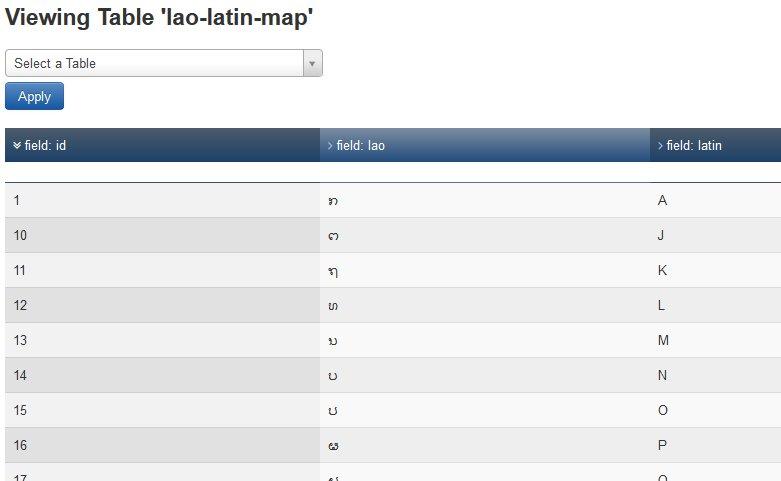Hi folks --
I am starting to make use of lookup tables -- I see you guys made it easier
to set up since I last looked at this!
I will use the lookup table to allow the user choose from a list of the
letters from the Lao alphabet, which will later be "concatted" together in
a hidden value into a code string, like ຂຄ-ງຂກ
To do this, I will have a lookup table that contains all Lao alphabet
characters. Then one question will say "what is the first letter" and it
will present a menu generated by the lookup table to choose the first lao
letter. A second question will do exactly the same.
That is of course easy. But my twist is that I want to also construct a
second version of the resulting code string... that will encode the lao
characters into corresponding LATIN characters. For each lao character,
there will be a corresponding latin character. The Lao character ກ will
have the code of A... the Lao character ກ will be B ... etc. So this "latin
version" resulting from the same set of choices could look like BC-DBA
I am guessing that I can just make an additional field name in my lookup
table, so that the table actually has that additional column... the lookup
table would look like:
1 ກ A 2 ຂ B 3 ຄ C 4 ງ D 5 … …
So let's imagine one of my form questions simply said "what is the first
letter of your code", and I had the question use the lookup table. And the
user chose the second Lao letter, ຂ.
Naturally, the resulting lao letter chosen by the user would be stored in
the form data as the answer for the question itself.
--> BUT my question is: How could I create a way to, in a separate place
in the data (I imagine a hidden value field), return the other value that
corresponded to that choice that the user had made for the first letter? In
other words, I'd love to have a formula in a hidden value that would return
"B", since that's the latin letter that corresponds to their answer. Then I
would simply construct my "latin version of the code" with that method.
... I was imagining that there would be an "instance" call that could look
up the answer that was given BUT to return the value in that third
column... or something like that. But I couldn't find an explanation of how
that Instance call works with a table.
... Another possible way of doing it: Let's assume that instead I used the
normal ID field in the table to store those "Latin values." Is there a call
that could tell me the ID of the value that was chosen in that earlier form
question?
thanks!
Eric


